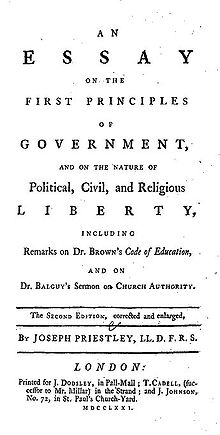
Essay on the First Principles of Government (1768) is an early work of modern liberal political theory by 18th-century British polymath Joseph Priestley.

Essay on the First Principles of Government (1768) is an early work of modern liberal political theory by 18th-century British polymath Joseph Priestley.
Priestley's friends urged him to publish a work on the injustices borne by religious Dissenters because of the Test and Corporation Acts, a topic to which he had already alluded in his Essay on a Course of Liberal Education for Civil and Active Life (1765).
Between 1660 and 1665, Parliament passed a series of laws that restricted the rights of Dissenters: they could not hold political office, teach school, serve in the military or attend Oxford and Cambridge unless they ascribed to the thirty-nine Articles of the Church of England. In 1689, a Toleration Act was passed that restored some of these rights, if Dissenters subscribed to 36 of the 39 articles (Catholics and Unitarians were excluded), but not all Dissenters were willing to accept this compromise and many refused to conform. Throughout the 18th century Dissenters were persecuted and the laws against them were erratically enforced. Dissenters continually petitioned Parliament to repeal the Test and Corporation Acts, claiming that the laws made them second-class citizens. The situation worsened in 1753 after the passage of Lord Hardwicke's Marriage Act which stipulated that all marriages must be performed by Anglican ministers; some refused to perform Dissenting weddings at all. [1]
In order to defend Dissenters, the text rearticulates John Locke's arguments from the Two Treatises on Government (1689), but it also makes a useful distinction between political and civil rights and argues for protection of extensive civil rights. [2] Priestley distinguishes between a private and a public sphere of governmental control; education and religion, in particular, he maintains, are matters of private conscience and should not be administered by the state. As Kramnick states, "Priestley's fundamental maxim of politics was the need to limit state interference on individual liberty." [3] For early liberals like Priestley and Jefferson, the "defining feature of liberal politics" was its emphasis on the separation of church and state. [4] In a statement that articulates key elements of early liberalism, Priestley wrote:
It must necessarily be understood, therefore, that all people live in society for their mutual advantage; so that the good and happiness of the members, that is the majority of the members of any state, is the great standard by which every thing relating to that state must finally be determined. [5]
Priestley acknowledged that revolution was necessary at times but believed that Britain had already had its only necessary revolution in 1688, although his later writings would suggest otherwise. Priestley's later radicalism emerged from his belief that the British government was infringing upon individual freedom. [6]
Essay on Government went through three English editions and was translated into Dutch.
Classical liberalism is a political tradition and a branch of liberalism that advocates free market and laissez-faire economics and civil liberties under the rule of law, with special emphasis on individual autonomy, limited government, economic freedom, political freedom and freedom of speech. Classical liberalism, contrary to liberal branches like social liberalism, looks more negatively on social policies, taxation and the state involvement in the lives of individuals, and it advocates deregulation.
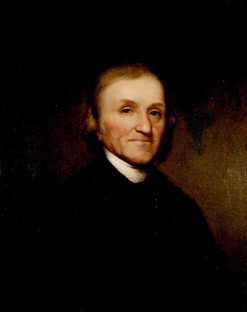
Joseph Priestley was an English chemist, natural philosopher, separatist theologian, grammarian, multi-subject educator, and liberal political theorist. He published over 150 works, and conducted experiments in several areas of science.

The Priestley Riots took place from 14 July to 17 July 1791 in Birmingham, England; the rioters' main targets were religious dissenters, most notably the politically and theologically controversial Joseph Priestley. Both local and national issues stirred the passions of the rioters, from disagreements over public library book purchases, to controversies over Dissenters' attempts to gain full civil rights and their support of the French Revolution.

Two Treatises of Government is a work of political philosophy published anonymously in 1689 by John Locke. The First Treatise attacks patriarchalism in the form of sentence-by-sentence refutation of Robert Filmer's Patriarcha, while the Second Treatise outlines Locke's ideas for a more civilized society based on natural rights and contract theory. The book is a key foundational text in the theory of liberalism.

Whiggism is a political philosophy that grew out of the Parliamentarian faction in the Wars of the Three Kingdoms (1639–1651). The Whigs advocated the supremacy of Parliament, tolerance of Protestant dissenters, and opposition to a "Papist" on the throne, especially James II or his descendants. It is associated with early conservative liberalism.

Liberal democracy, Western-style democracy, or substantive democracy is a form of government that combines the organization of a representative democracy with ideas of liberal political philosophy.

The political philosophy of Immanuel Kant (1724–1804) favoured a classical republican approach. In Perpetual Peace: A Philosophical Sketch (1795), Kant listed several conditions that he thought necessary for ending wars and creating a lasting peace. They included a world of constitutional republics by establishment of political community. His classical republican theory was extended in Doctrine of Right (1797), the first part of Metaphysics of Morals. At the end of the 20th century Kant's political philosophy had been enjoying a remarkable renaissance in English-speaking countries with more major studies in a few years than had appeared in the preceding many decades.

Joseph Priestley was a British natural philosopher, Dissenting clergyman, political theorist, and theologian. While his achievements in all of these areas are renowned, he was also dedicated to improving education in Britain; he did this on an individual level and through his support of the Dissenting academies. His grammar textbook was innovative and highly influential. More importantly, though, Priestley introduced a liberal arts curriculum at Warrington Academy, arguing that a practical education would be more useful to students than a classical one. He was also the first to advocate the study and teaching of modern history, an interest driven by his belief that humanity was improving and could bring about Christ's Millennium.

Joseph Priestley was a British natural philosopher, political theorist, clergyman, theologian, and educator. He was one of the most influential Dissenters of the late 18th-century.

The Institutes of Natural and Revealed Religion, written by 18th-century English Dissenting minister and polymath Joseph Priestley, is a three-volume work designed for religious education published by Joseph Johnson between 1772 and 1774. Its central argument is that revelation and natural law must coincide.
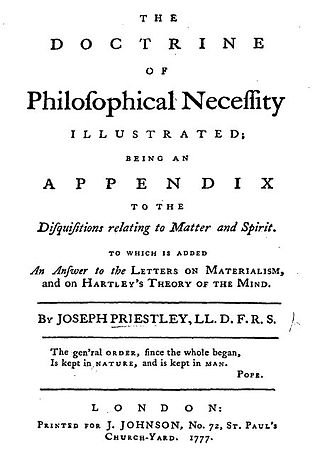
The Doctrine of Philosophical Necessity (1777) is one of the major metaphysical works of 18th-century British polymath Joseph Priestley.
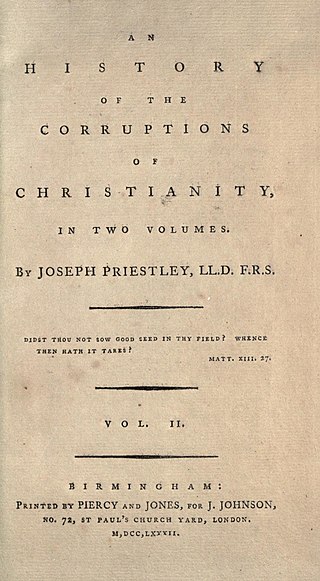
An History of the Corruptions of Christianity, published by Joseph Johnson in 1782, was the fourth part of 18th-century Dissenting minister Joseph Priestley's Institutes of Natural and Revealed Religion (1772–74).
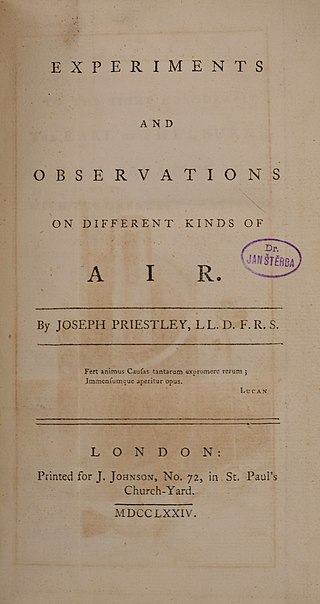
Experiments and Observations on Different Kinds of Air (1774–86) is a six-volume work published by 18th-century British polymath Joseph Priestley which reports a series of his experiments on "airs" or gases, most notably his discovery of the oxygen gas.
Articles in social and political philosophy include:
Liberalism is a political and moral philosophy based on the rights of the individual, liberty, consent of the governed, political equality, right to private property and equality before the law. Liberals espouse various and often mutually warring views depending on their understanding of these principles but generally support private property, market economies, individual rights, liberal democracy, secularism, rule of law, economic and political freedom, freedom of speech, freedom of the press, freedom of assembly, and freedom of religion, constitutional government and privacy rights. Liberalism is frequently cited as the dominant ideology of modern history.
Liberalism, the belief in freedom, equality, democracy and human rights, is historically associated with thinkers such as John Locke and Montesquieu, and with constitutionally limiting the power of the monarch, affirming parliamentary supremacy, passing the Bill of Rights and establishing the principle of "consent of the governed". The 1776 Declaration of Independence of the United States founded the nascent republic on liberal principles without the encumbrance of hereditary aristocracy—the declaration stated that "all men are created equal and endowed by their creator with certain unalienable rights, among these life, liberty, and the pursuit of happiness". A few years later, the French Revolution overthrew the hereditary aristocracy, with the slogan "liberty, equality, fraternity" and was the first state in history to grant universal male suffrage. The Declaration of the Rights of Man and of the Citizen, first codified in 1789 in France, is a foundational document of both liberalism and human rights, itself based on the U.S. Declaration of Independence written in 1776. The intellectual progress of the Enlightenment, which questioned old traditions about societies and governments, eventually coalesced into powerful revolutionary movements that toppled what the French called the Ancien Régime, the belief in absolute monarchy and established religion, especially in Europe, Latin America and North America.
Isaac Kramnick was an American political theorist, historian of political thought, political scientist, and the Richard J. Schwartz Professor of Government at Cornell University. He was a subject-matter expert on English and American political thought and history.
Liberalism is a school of thought within international relations theory which revolves around three interrelated principles: